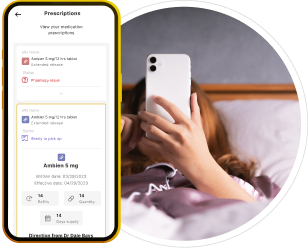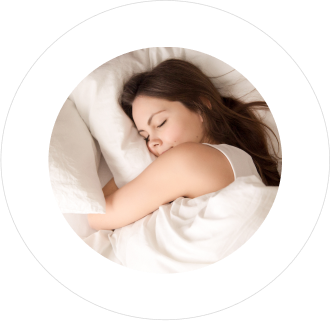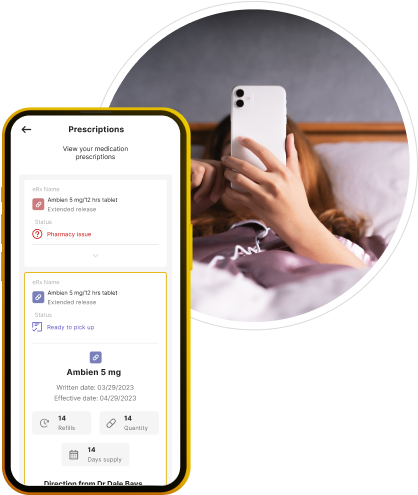Insomnia Treatment Online at MEDvidi
Solid sleep is the foundation of a healthy body and mind.
See a medical provider online and receive a prescription for sleep medication if deemed necessary.

Sleep Calculator: How Much Sleep Do You Need?
we recommend this bedtime:
Why Choose MEDvidi?
-
Qualified healthcare professionals
-
Online prescription management
-
Personalized plans
-
Evidence-based treatment
-
A flexible system of follow-ups
plans
Evidence-based
treatment
A flexible system of
follow-ups
How We Work
Sign up for an account, choose an appointment date and time, and then book your online visit.
See a healthcare provider experienced in insomnia treatment, who will create a personalized treatment plan and issue an online prescription, if necessary.
Attend online follow-ups to monitor the effectiveness of treatment and obtain any prescription refills from home.
Start Online Insomnia Treatment Today
- An online 30-minute visit
- Symptom check
- Identifying treatment goals
- Developing a treatment plan
- Prescribing medications if required
Follow-ups
- Regular 15-minute visits
- Symptoms monitoring
- Prescription refill
- Treatment adjustments
No insurance is needed. Just schedule an appointment and receive personalized treatment without waiting for approval from your insurance provider.
Our Medical Team Is Here to Help You Feel Better
All-in-one Personal Portal
- Easy scheduling: Schedule a visit from your couch, any time, no waiting in line!
- Comprehensive visit management: Reschedule your appointment in a few clicks.
- Plan in advance: No forgetting to schedule that follow-up next month!
- Track your prescription online: Check your prescription status anytime and know when the medication is ready to pick up.
- Switch pharmacies: Your chosen pharmacy doesn't have your medication? Select another one in a minute.
- Save personal details: No need to repeatedly fill out personal and medical information. Just choose a date and time to book a visit.

Medication Management for Insomnia
Psychotherapy, such as cognitive-behavioral therapy, is the first-line treatment for insomnia. In some cases, patients may also require medications to aid relieving insomnia symptoms.
The most common options include:
Melatonin agonists for insomnia include melatonin (a dietary supplement, not under FDA regulations) and ramelteon (Rozerem)—an FDA-approved medication for onset insomnia.
Nonbenzodiazepines (zolpidem (Ambien), zaleplon (Sonata), eszopiclone (Lunesta)) include sedative-hypnotics and CNS depressants, and as Schedule IV substances they require a prescription. They cause fewer side effects than benzodiazepines.
Orexin receptor antagonists (suvorexant (Belsomra), lemborexant (Dayvigo), daridorexant (Quviviq)) work on binding orexins regulating sleep-wake cycles.
89% of our patients achieve clinically significant results and notice long-lasting effects.
Why Is It Important to Treat Insomnia?
Experiencing insomnia can be incredibly frustrating and stressful, and in the long run, a lack of sleep can lead to physical health problems, obesity, and an increased risk of depression and anxiety. It may also cause tiredness and weakened cognitive abilities, negatively impacting social life and work performance.
Our medical team uses evidence-based approaches and the latest guidelines when developing plans for insomnia treatment.
Advantages of Online Prescriptions

- Fewer errors in medication names and dosages
- Easily accessible prescription history
- Wider availability of services
- Shorter wait times
- No need to visit a clinic every month
- Smooth workflow, as online prescriptions can be delivered directly to pharmacies
| MEDvidi | Traditional Clinics | |
|---|---|---|
| Cost of an initial visit | $195 | $400-500 |
| Medical providers specialized in insomnia treatment | ||
| Treatment planning | ||
| Appointments within a couple of days | ||
| Booking a visit in minutes | ||
| Saving time & money on travel | ||
| Video appointments from home | ||
| Online prescriptions sent to your pharmacy | ||
| Online prescription refills and treatment adjustments | ||
| Fast and caring responses from the Care Team |
The Main Symptoms of Insomnia
Insomnia treatment for adults starts with analyzing the symptoms and their severity. The key signs include:
Insomnia Diagnostics: What’s Involved
Get Personalized Insomnia Treatment Based on Your Diagnosis
Chronic insomnia is diagnosed if symptoms are noticed at least three nights a week for three months or longer.
Primary chronic insomnia occurs because of severe or recurrent concerns, worries, or stressors. It may last for years and worsen because of stress.
Secondary insomnia is caused by underlying medical conditions, such as asthma, allergies, chronic pain, diabetes, gastroesophageal reflux disease, heart disease, or mental health issues.
Living With Insomnia Is a Challenge.
Useful Articles About Sleep Disorders

What are the consequences of untreated sleep disorders?
If left untreated, insomnia may increase the risk for mental and physical health disorders, including high blood pressure, stroke, asthma, anxiety, and depression. It may also negatively affect brain functioning, memory, and ability to concentrate, which increases the risk of accidents. Seek professional treatment to avoid such consequences.
Does Covid cause insomnia?
Yes, insomnia is one of the most common symptoms occurring after the COVID-19 recovery, especially if the patient underwent a severe case of COVID. Insomnia is a symptom of long-term COVID and while its nature is not yet completely researched, generally, it can last up to 12 months.
How to treat chronic insomnia?
Since chronic insomnia can develop as a response to coexisting physical or mental illnesses, the treatment always starts with a thorough evaluation of the symptoms and health history. Apart from managing the underlying conditions, using sleep medications and cognitive-behavioral therapy is commonly recommended. Also, relaxation therapy, physical activity, paradoxical intention therapy or sleep restriction, herbal and dietary supplements, and other treatment options can be helpful.
Is insomnia curable, or can it only be managed?
Insomnia is treatable, but consistent solid and restful sleep with treatment depends on the causes and the severity of symptoms. Medical care should be paired with the patient’s active involvement in the treatment process.
What is the best treatment for insomnia in older adults?
The best treatment for insomnia in older adults starts with setting up healthy sleep hygiene and assessing underlying health conditions that may cause sleep issues. After that, psychotherapy, medications, or a combination of approaches can be used.
Is insomnia a mental health diagnosis?
Insomnia is a mental health condition. However, it is usually not an isolated disorder but a consequence of experiencing physical or mental issues and poor sleep hygiene. That is why a detailed evaluation is required to define whether there are any other illnesses.
How do doctors test for insomnia?
How do doctors test for insomnia?
The clinical insomnia diagnosis is based on an overview of symptoms, sleep habits, and health history, including any underlying conditions. Sometimes, additional methods like a sleep diary, home sleep testing, blood tests, and sleep studies can be used.
What is the best medication for insomnia?
The most commonly prescribed medications for insomnia include non-benzodiazepine GABA agonists (Z drugs) and benzodiazepines. Please note that only a healthcare provider can prescribe medications according to the symptoms and health history.
What medication is used for long-term insomnia?
Benzodiazepines are the most frequently used chronic insomnia medications. However, other medications can be chosen according to the symptoms and medications history.
What medications cause insomnia?
If you take selective serotonin reuptake inhibitors, beta-agonists, dopamine agonists, anticonvulsants, psychostimulants, or pills influencing blood pressure regulation, you may experience the symptoms of insomnia. Consult with your doctor about the medications you take whenever you experience side effects from them.
How to get rid of insomnia without medication?
Mild insomnia can be treated with the help of sleep therapy and lifestyle changes. These include reducing caffeine and alcohol intake, adding regular physical activity to your schedule, practicing healthy sleep hygiene, and practicing relaxation techniques. However, in some cases, medications may be required to help overcome the symptoms, so don’t hesitate to see a sleep specialist.
What medical conditions cause insomnia?
Diabetes, chronic pains, asthma, certain heart issues, overactive thyroid, cancer, sleep apnea, and Alzheimer’s disease are some of the illnesses that may cause insomnia. Seek professional help to learn if any other condition could cause your sleep issues.
Can I get prescribed sleeping pills online?
Yes, healthcare professionals can prescribe medications for insomnia online. The decision is based on a detailed assessment of symptoms and medical history.
Can I get prescription sleeping pills online without a doctor?
Only over-the-counter medications for insomnia, such as Benadryl and Unisom, can be obtained without a prescription. It is still important to discuss suitable treatments with a sleep doctor before taking them.
Can I get strong sleeping pills over the counter?
Strong medications for insomnia require a prescription. Consult with your clinician to receive a personalized treatment plan and get prescribed a suitable medication if required.









